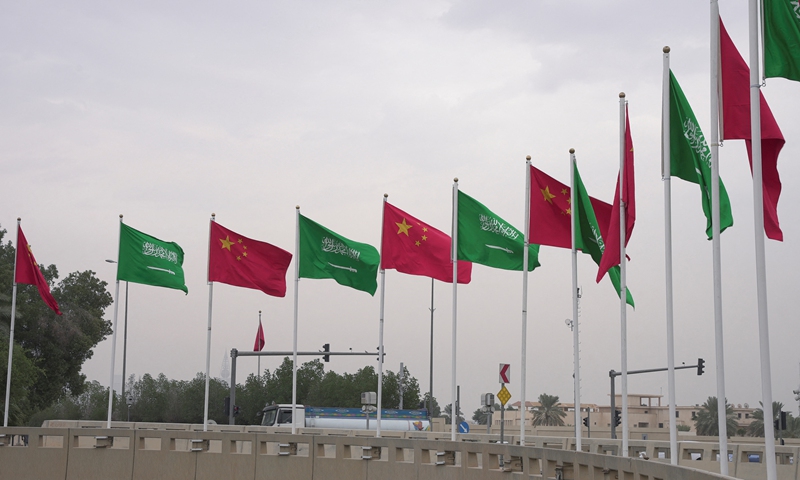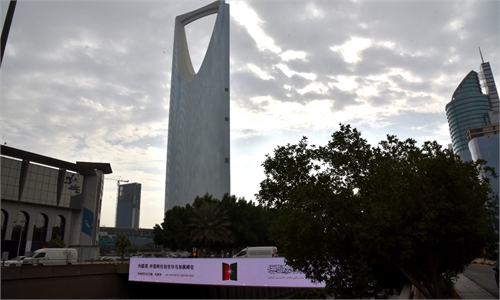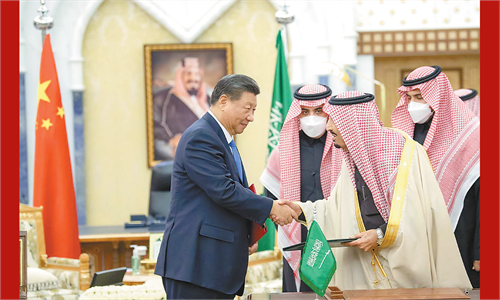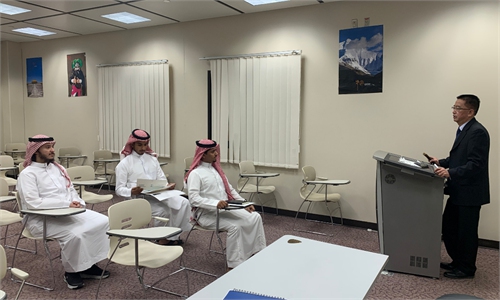West should make up for the knowledge of the essence of China-Arab cooperation

The national flags of China and Saudi Arabia are seen on the street of Riyadh ahead of the China-Arab States Summit on December 7, 2022. Photo: thepaper.cn
On December 8, Chinese Foreign Ministry spokeswoman Hua Chunying tweeted an ancient Arab saying in Chinese, Arabic and English -- "You have to strive for knowledge, even as far as China."This is a famous quote of the Muslim prophet Muhammad, which has been passed down across the Middle East for more than 1,400 years. It not only reflects the strong desire of the Arab nation for knowledge, but also records the long history of communication relations between China and the Arab world.
Western elites and media probably do not pay attention to this message because, in their view, China's engagement with the Middle East, like that of the West, is an expansion of capital, always with multiple and varied calculations of interests. Hence, there is talk of China trying to fill the vacuum of the US in the Middle East.
US President Joe Biden has really taken this argument seriously. During a visit to Saudi Arabia in July, he said that the US "will not allow China and Russia to fill the vacuum in the Middle East."
By looking at China's cooperation with the Arab states from the lens of strategic competition and spheres of influence, President Biden is revealing a "lack of knowledge." It is with this "deficit" that US global strategy continues to increase its containment of China.
The relationship between China and the Arab countries, of course, has its own self-interests involved, but these "interests" include mutual learning and exchange. This is an important dimension of knowledge that we should "strive for" today.
The reason why China's cooperation with Arab countries has always been carried out on the basis of win-win cooperation also reflects the basic characteristics of this knowledge.
Can China's trade with Arab countries be increased? Can oil settlements be made in yuan? Does China have the capacity to provide more support for the infrastructure needed by Arab countries? All of these questions involve the interests of both sides and are important. But more important is the way in which we will advance cooperation, and how that will contribute to enhancing the economic development of both parties.
The most important challenge facing China and the Arab countries is economic development. Without sustainable development, there will be no stability. Many countries in the Middle East have suffered from this. One after another, they have been the testing ground for Western-inspired "color revolutions," which have resulted in a continuous spiral of unrest.
Some Western scholars also see this problem. Belgian-born economist Stefan Dercon has recently published a new book, Gambling on Development: Why Some Countries Win and Others Lose, which has attracted widespread attention.
Dercon writes, "the defining feature of a development bargain is a commitment by those with the power to shape politics, the economy and society, to striving for growth and development." So, you don't need to be an ideal democracy with a perfect set of economic policies to roll the development dice.
This is clearly a point worthy of deeper discussion. If development is the priority, and to achieve it, one cannot dogmatically rely on a set of rules made by Western democracies that first require a change of system if one is deemed undemocratic.
Looking back at the development experience of Middle Eastern countries since the turn of the century, one striking difference is that countries that focus on development and whose governments are also capable of promoting it, rather than going for a democratic system first, are less volatile and more stable. And stability, which is the condition for sustained development, is time and space to explore their own development path, including gradual political reform.
This is the key to the common will of China and the Arab countries to further enhance cooperation. What China can offer Arab countries is beneficial to their development, or what they desperately need for their development, not only in material terms but also in conceptual terms.
China has provided a reference for the Arab world with its own stable and sustained development. What China can do, the Arab countries must be able to do as well.
The author is a senior editor with People's Daily, and currently a senior fellow with the Chongyang Institute for Financial Studies at Renmin University of China. dinggang@globaltimes.com.cn. Follow him on Twitter @dinggangchina




